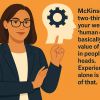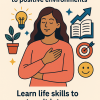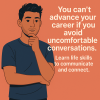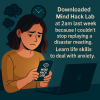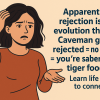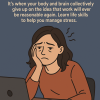Gen Z and Career Minimalism: What It Really Means for Business
Life skills to manage workplace anxiety and find work-life balance
68% of Gen Z say they'd skip management if it weren't for the title or paycheck. Glassdoor.
I saw that stat while hiding in the bathroom during our all-hands meeting. You know, the one where they announced the "exciting leadership opportunities" that come with 70-hour weeks and the kind of stress that makes your eye twitch permanently? Yeah. That meeting.
And suddenly everything made sense. Why I keep saying "I'll think about it" when my boss hints at promotion. Why my friend Jake went from Senior Analyst to freelance consultant to guy who makes artisanal hot sauce. Why I'm writing this at 2 AM because I can't sleep anyway after checking Slack at 11 PM like an idiot.
Career Minimalism: Or How I Learned to Stop Climbing and Love the Lily Pad
Here's the thing nobody tells you in those awful LinkedIn posts about "grinding" and "hustling" - watching your manager have a breakdown in the supply closet really changes your perspective on career goals.
Career minimalism isn't about being lazy. Trust me, I work my ass off. It's about looking at the deal on the table and saying "actually, no thanks."
The deal used to be: work yourself to death, get promoted, make money, retire maybe if you live that long.
The new deal we're creating: work sustainably, get paid fairly, have an actual life, build multiple income streams because companies are one bad quarter from "restructuring" you out of existence.
We want:
- Jobs that don't follow us home (radical concept, I know)
- Managers who don't text at midnight about "urgent" spreadsheets
- Time to pursue things that actually matter (relationships, hobbies, that novel you'll never write)
- Skills that work anywhere (because company loyalty is dead and they killed it)
The Data That Corporate Doesn't Want You to See
57% of Gen Z have side hustles
Everyone's acting like this is because we're "unfocused" or "not committed."
No, Karen from HR. It's because we watched our parents get laid off after 20 years of perfect attendance. We graduated into the 2008 recession or the pandemic or whatever economic disaster was trending that year. We did the math on rent versus salary and realized the American Dream is basically a pyramid scheme now.
The KPMG report called us "difficult to manage" which is corporate-speak for "won't work for free anymore." We ask why we're doing things. We negotiate salaries (the audacity!). We leave when better opportunities come up. We don't pretend to care about company pizza parties.
Downloaded Mind Hack Lab at 3 AM after a particularly soul-crushing day where I presented for 4 hours straight and then got feedback that I need more "executive presence." Whatever that means. The 30-minute session for presentation anxiety actually helped but honestly I was mostly there because I couldn't sleep and doom-scrolling wasn't helping.
Why I Chose the Lily Pad Over the Ladder
Traditional career path: Entry level → Senior → Manager → Director → VP → Dead inside
My career path: Analyst → Different analyst → Consultant → Part-time consultant + freelance writer + person who remembers their friends' names
It's not lack of ambition. It's strategic preservation of sanity.
Every job is a lily pad. You hop on, learn what you can, build your network, save your money, and when it starts sinking (or demanding your soul), you hop to the next one. No guilt. No "we're a family" manipulation. Just business.
actually wait this reminds me. Last week my skip-level asked about my "career aspirations" and I said "to afford therapy" and she laughed but I wasn't joking. Then she started talking about leadership development and I just kept nodding while mentally calculating if I could afford to quit.
We're entering management roles at higher rates than ever but only because:
- Remote work is non-negotiable (commuting for no reason? pass)
- Mental health boundaries are explicit (no, I won't be available 24/7)
- Results matter more than face time (revolutionary concept)
- Flexibility is baseline (doctor appointments shouldn't require PTO negotiation)
What "Ambition" Looks Like When You're Not Drinking the Kool-Aid
Real conversation from last Tuesday:
Boss: "Where do you see yourself in 5 years?"
Me: "Alive. Mentally stable. Maybe owning property if the market crashes."
Boss: "I meant career-wise."
Me: "So did I."
Old ambition vs New ambition
Old ambition: Corner office, company car, early heart attack
New ambition: Sustainable income, actual free time, diverse skills, maybe learning pottery
The side hustle thing isn't about being an "entrepreneur" (god I hate that word). It's about having options when your company decides to "pivot" or "rightsize" or whatever they're calling layoffs this quarter.
tried another Mind Hack Lab brief intervention - the one for work-life boundaries. The AI coach asked me to identify when work thoughts invade personal time. Had to laugh because that's... always? Literally always. There's some technique about creating mental transitions but I was distracted by a Slack notification so I'll have to redo it.
The Life Skills They Should've Taught Us Instead of Calculus
Here's what we actually need to survive modern work:
Boundary Setting Without Guilt
"No, I can't take that call at 8 PM" shouldn't require a doctoral thesis defense
Confidence Without the Title
Because "executive presence" is just code for "act like an old white dude"
Communication That Actually Works
Not corporate buzzword bingo but actual human conversation
Stress Management That Isn't Just "Try Yoga"
Because yoga doesn't fix systemic workplace dysfunction
Focus in an Open Office Hellscape
Whoever invented open offices has never tried to concentrate near Brad's speakerphone calls
Day 8 of tracking my triggers in that Mind Hack Lab workbook. Turns out it's not all meetings - just the ones where I have to present to people who make 10x my salary while pretending their ideas are groundbreaking. Very specific. Very helpful to know.
What This Actually Means for People Like Us
If you're reading this at 2 AM because you can't sleep after tomorrow's presentation, here's the real talk:
Your Career Doesn't Define You
I know LinkedIn says otherwise but LinkedIn is where hope goes to die
Sustainable is Better Than Meteoric
Burning out at 35 isn't success, it's poor planning
Multiple Income Streams Aren't Disloyal
They're smart. Your company would replace you tomorrow.
Life Skills Matter More Than Excel Skills
Nobody cares about your pivot tables when you're having a panic attack
Boundaries Are Professional, Not Personal
Saying no to overtime isn't lazy, it's self-preservation
The Actual Path Forward (For Those of Us Who Can't Just Quit)
Look, I can't just walk away. Rent exists. Student loans exist. The vague hope of retirement exists. But I can:
- Build skills that transfer anywhere
- Create income outside the 9-5
- Set boundaries even when it's uncomfortable
- Stop pretending the company is family
- Invest in life skills that actually help
That presentation anxiety session? Actually using those techniques now. Still hate presenting but at least my voice doesn't do that shaky thing anymore. Usually. Okay sometimes it still does but less.
Started mapping out my lily pad strategy:
- Current job (pays bills)
- Freelance writing (builds portfolio)
- Consulting (uses my actual skills)
- That app idea (probably won't work but worth trying)
- Teaching online courses (if I can figure out how)
It's not about having a backup plan. It's about having backup plans for your backup plans.
Why This Matters More Than Any Performance Review
68% of us would skip management. That's not apathy. That's clarity.
We've seen what traditional success costs. The stress-related health issues. The relationships that die from neglect. The hobbies abandoned. The person you become when work is everything.
No thanks.
Career minimalism isn't about doing the minimum. It's about maximizing life while minimizing the soul-crushing parts of work. It's about being great at your job from 9 to 5 and then being great at being human the rest of the time.
wait where was I going with this? Right. The point.
The point is we're not broken for wanting work-life balance. We're not entitled for setting boundaries. We're not unfocused for having side hustles. We're adapting to a world that demands everything and promises nothing.
The Thing I Realized at 2:47 AM
Maybe the real career development is the life skills we build along the way. The ability to say no. The confidence to negotiate. The emotional regulation to not scream when Brad interrupts you for the fifth time. The focus to work despite open office chaos. The boundaries to close the laptop.
These aren't soft skills. They're survival skills. And they're worth more than any promotion.
I should probably try that sleep session on Mind Hack Lab. The insomnia is getting worse and I'm starting to make mistakes in spreadsheets. But also it's now 3 AM and I'm still typing because apparently I have strong opinions about career minimalism.
Whatever. The message is simple: build a life that work fits into, not the other way around. Learn the skills that help you stay sane. Create multiple options. Stop climbing ladders that lead nowhere good.
And maybe, just maybe, we can create workplaces that don't require life skills training just to survive them. But until then, we lily pad our way forward, one sustainable hop at a time.
going to attempt sleep now. Tomorrow's another day of pretending to care about Q4 targets while secretly updating my portfolio. Such is the career minimalist way.
actually one more thing
Ready to Build Your Lily Pad Strategy?
Learn the life skills that actually matter for sustainable career success.



